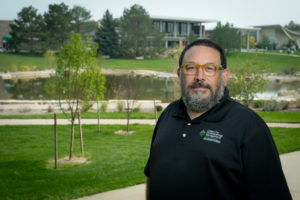
Reymundo “Tony” Chapa, the newly appointed director of the Center for Environmental Management of Military Lands at Colorado State University, has an extensive career filled with military, academic and project management experience.
Chapa served as interim executive director for one year leading up to the appointment and previously held the role of the associate director of cultural resources at the Center for Environmental Management of Military Lands (CEMML), a service, education and research unit in Warner College of Natural Resources.
The team at CEMML works closely with the Department of Defense, U.S. Army Corps of Engineers and National Park Service, among other departments and agencies.
As director, Chapa will oversee the center’s staff, 500 whom are stationed at Department of Defense (DOD) facilities throughout the United States and more than 70 staff based on campus at CSU. CEMML’s diverse range of professionals work in resource management and planning, research, education and outreach efforts that inform military and other federal managers on the use and conservation of military-owned lands and public-trust resources.
Chapa, a U.S. Army combat veteran and archaeologist, is incredibly well-suited to direct the center, said Warner College Dean John Hayes.
“Tony comes to us with a depth of experience engaging with DOD, both as a member of the military and as a civilian,” Hayes said. “This background, combined with his experience with cultural resources, his leadership background and his vision set the foundation for a strong future for CEMML.”
An eclectic academic background
After Chapa served four years as a German-Spanish linguist in the U.S. Army, which included a deployment to Operation Desert Storm, he attended college, taking an elective course in anthropology. His professor was a former Navy hospital corpsman who had served in the Vietnam War. Meeting the fellow veteran and scholar awakened a passion for archeology and changed Chapa’s perspective of who college was meant for.
“I saw something in him, an association. It was at that point I realized anyone could be an archaeologist. It wasn’t just for the rich,” Chapa said.

He earned a bachelor’s degree in anthropology and a master’s degree in political science from Texas State University-San Marcos as well as master’s degrees in anthropology and archaeology from the University of Wisconsin-Madison. Chapa remains a registered professional archaeologist today.
It was through his roles in archeology that Chapa got a feel for project management, which set him apart from his academic counterparts.
“When I was in archaeology, I was already starting to gravitate towards project management – putting things together and managing money for projects, which is what a lot of academic archaeologists don’t like to deal with,” Chapa said. “They like to deal with the science. I took to logistics, and that really helped me have an eye and an expertise in project management.”
A ‘military mindset’
Chapa’s military background goes beyond his own service. His father served as an Army pilot for 20 years and raised the family on military bases. There, Chapa developed a personal outlook he calls a “military mindset,” and it has informed much of his career.

Though Chapa was accepted into a doctoral degree program for archaeology, he chose to pursue opportunities in government-related project management instead. While working with Lockheed Martin in Afghanistan in 2011, the Air Force took notice of Chapa’s unique education and war-zone experience. He was offered a cultural resources management position and quickly moved up the ranks in that capacity. The role fostered an understanding of DOD workflow and expectation that will help guide Chapa with overseeing more than 140 separate cooperative agreements, he said.
Today, CEMML brings in around 24 percent of CSU’s annual research awards each year, with the majority of its funding coming from the DOD. In Fiscal Year 2019, the center’s awards accounted for $95.8 million of the university’s total of $398.5 million. From 2013 to 2019, CEMML tripled its award amounts, signaling the strengthening of the relationship between CEMML and the DOD.
“When we’re awarded funds, we’re expected to produce a product within a certain amount of time,” Chapa said. “That pace is what has made me good at this job. Having a ‘military mindset’ – and it’s really just a project-management, goal-oriented mindset – helps us get to a destination more quickly, and that’s the expectation.”
A vision for the future
Chapa’s vision for CEMML is to continue the excellence under which they already operate. He attributes this to the dedication and adaptability of the center’s principal investigators. He also hopes to extend CSU’s land-grant mission to other agencies that CEMML works with regularly.
“I want CSU to remain a trusted partner with the Department of Defense,” he said. “I want CEMML to advocate for plans that help the DOD meet its mission while at the same time elevating and fulfilling our own responsibility to preserve and protect the environment.”
Moreover, Chapa said he hopes to bring more awareness about CEMML on CSU’s campus. This vision has already spurred CEMML’s creation of a graduate certificate in Sustainable Military Lands Management, an online program from Warner College meant to meet the demand for highly-skilled and educated environmental professionals to manage military lands. The program also serves to reach military veteran students on campus.
“We have the largest percentage of veterans in Warner College,” said Chapa. “Some of those veterans may want to continue to serve the military mission with a new set of skills. They could work for the DOD and manage a wildland fire program or help manage an invasive species. All veterans feel kinship and loyalty to the DOD, and we can serve that niche here at CSU.”